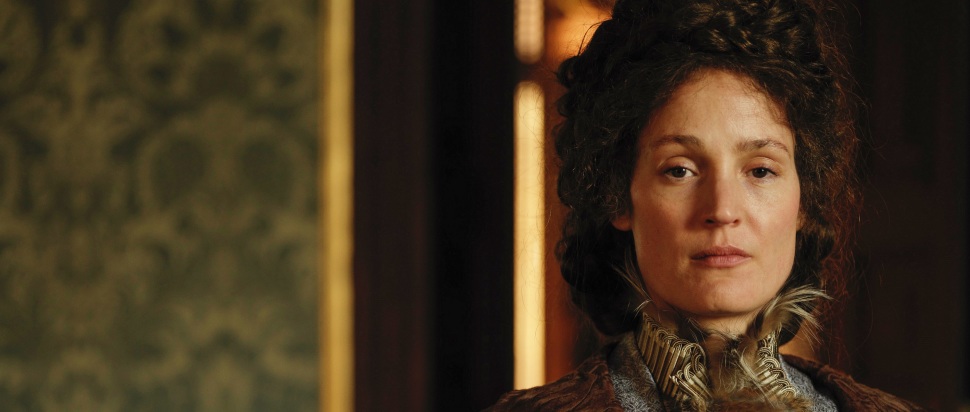Marie Kreutzer on royalty, celebrity, and Corsage
In Corsage, Austrian director Marie Kreutzer brings a radical new interpretation of the life of Empress Elisabeth of Austria to the screen
The films of Austrian director Marie Kreutzer focus on women at breaking point. In Kreutzer's latest, Corsage, she reimagines the life of Empress Elisabeth of Austria – beautiful, reclusive and ubiquitous on Viennese tourist tat – on the eve of her 40th birthday. Vicky Krieps’ fierce performance as Elisabeth gives life to a woman fighting a station she did not choose and delighting in small freedoms.
Elisabeth’s quest for liberty goes alongside a need for connection. Scenes with her family and servants flash between affection and irritation under close quarters. Kreutzer drew much from research but, in a run-time just shy of two hours, impressions count more. “I had to boil relationships down to their essence,” Kreutzer tells us. It would be easy to make Elisabeth's husband, Franz Joseph II, the antagonist, but the reality was nuanced. “He took care of people,” she explains. “He never let anyone go. That's how I came up with the idea that he always knew servant’s names and was friendly to them.” By contrast, Elisabeth often calls her servants by the wrong name. “He loved his wife, but he was too small for her in many ways,” Kreutzer adds, and she doesn't just mean figuratively. Corsage is the first film about Elisabeth to – accurately – cast an actress as Elisabeth who's taller than the actor playing Franz.
Their children, Crown Prince Rudolf and Archduchess Marie Valerie, are created with equal honesty. “[Elisabeth] had a very close relationship to her children but did not raise them,” says Kreutzer. “They were raised by people who told them that their main goal in life was to be perfect, so they were trying to meet the expectations of that structure. It was important to show Elisabeth surrounded by people but really lonely.”
Complicating the picture, Elisabeth adheres to a strict exercise and diet regime, snapping at maids when they cannot tighten her corset enough. This contrast of freedom and self-restriction drew Kreutzer in. “I wanted to show that point between two sides of [Elisabeth]. She knew her looks and waist were her currency. That's hard to let go, if that's all you have.” But this creation “was never her – she was thrown into it as a 16-year-old.” Watching Elisabeth struggle with being loved for perfection or for herself proves the film’s crux, and the outcome feels uncertain. “It was important to show her when her life starts to shift,” explains Kreutzer. “It's hard work being perfect. That was her job for too long.”
Kreutzer read 19th-century newspapers to see how Elisabeth was spoken about by contemporary observers. “The articles are like those about Meghan Markle, judging her for how she was dressed or if she had gained weight. It's very similar to what we observe today with celebrities, and more so with royal figures because they have to meet public expectations and the expectations of their system. But this is not a film about royalty, but women who are still raised to please.”
A striking sequence occurs when Elisabeth meets French artist Louis le Prince, who invented an early form of motion-picture camera. Kreutzer doesn’t remember how the filmmaking pioneer made his way into her story, but it came from research unconnected to Corsage. “I like the idea of Elisabeth being able to create another image of herself. It's a symbol for another way.” Freed by le Prince's proto-silent film, the empress kicks her heels and screams. By contrast, Rudolf remains “in classic portrait mode” during this moving image.
Elisabeth’s story has been immortalised on film most famously in Ernst Marischka’s saccharine Sissi trilogy but Kreutzer’s design vividly sets Corsage apart. She drew inspiration from Elisabeth’s quarters – “big, beautiful, but very dark” at Vienna’s Hofburg. With every window facing a courtyard, there’s little light or greenery. Corsage’s palaces are empty, decrepit, and decaying. “When designers showed me original furniture and clothing, I would say it’s too kitschy,” Kreutzer says. Consequently, the team incorporated early 20th-century designs, adding a playful bent to Elisabeth’s own modern outlook. Kreutzer then focused on lines, silhouettes, and unusual textures that looked “very beautiful” on 35mm in these cavernous yet claustrophobic spaces.
Elisabeth loved her horses and dogs, who feature prominently and frequently in her poems, diaries and letters. Kreutzer’s experiences with the animal stars of Corsage varied. “The horses were amazing. The dogs were much more difficult,” Kreutzer says, noting she picked dogs fitting the Empress’s specifications rather than camera-ready animals. “It was worth it but stressful. There was a lot of meat and sausage around.”
Corsage’s subversion reaches its apotheosis in its closing minutes. To Kreutzer, Elisabeth becomes the director of this plausible fiction by “taking control of her life and how it would go on.” There is room for conspiracy: Elisabeth never showed her face in public as she aged, and later imperial portraits are “made-up paintings” inspired by old images. “It's not really seeing the same person,” Kreutzer says. “There is space for speculation.” For a film determined to create its own history for one who never had the chance, it’s a radical, refreshing spin.
Corsage is released 26 Dec by Picturehouse Entertainment
